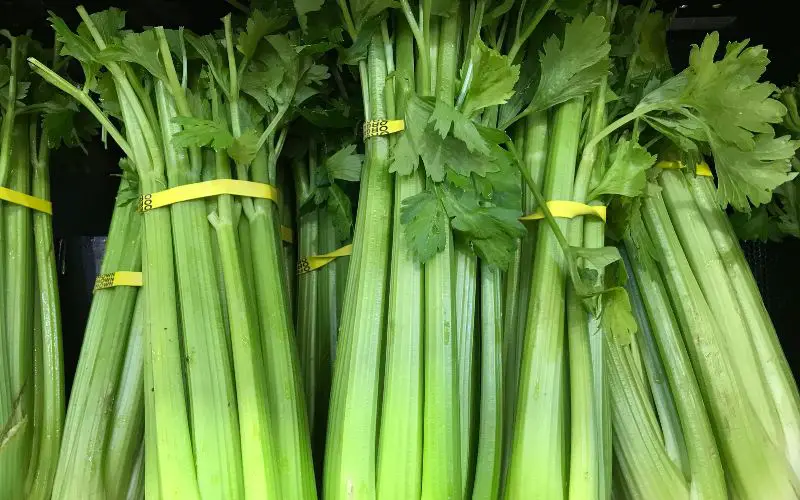Why Does My Celery Taste Salty? (Must Know This)
Last updated on October 26th, 2022 at 05:20 pm
Celery’s one of the most recognized healthy snacks. It contains low calories and is perfect for dieting.
Also, you can use it to make tasty dishes like stir-fries and casseroles.
But have you ever cooked with celery and realized that the food tastes too salty even when you only added a little salt for flavoring?
You may wonder where that salt came from; it was the celery. It usually contains a relatively high amount of saltiness, but why?
Celery tastes salty because it contains a high amount of Sodium, among other minerals. And Sodium makes up about 40% of salt. Due to this, many use ground celery as salt. The ground seeds are combined with table salt as an alternative flavoring. Despite its saltiness, celery is a nutritious vegetable; and won’t cause problems when eaten/used wisely.
Why Does My Celery Juice Taste Salty?

You’ll likely feel the salty taste of a cup of celery juice due to its 215 milligrams of Sodium in a cup.
Juicing celery makes them retain their salty taste better and intensifies their nutrients.
They’re healthy and have anti-inflammatory abilities.
While they may contain much salt, they aren’t dangerous to health, especially when you consume them appropriately.
The table below shows some nutrients in celery juice and its functions and will enable you to see that the salty taste of celery enhanced in juicing doesn’t prevent it from being healthy.
| Juiced Celery Nutrients | Health Functions |
|---|---|
| Vitamin A | Protects the eyes from night blindness improved your immune system Reduces acne and gives you clear skin Supports bone health |
| Vitamin C | Helps make collagen for quicker injury healing Prevents iron deficiency Boosts immunity |
| Vitamin K | Enhances blood clotting Helps with the building of healthy bones |
| Calcium | Helps in building healthy, strong bones and teeth Enhances muscle movements Prevents kidney stones |
| Magnesium | Enhances exercise performance Promote heart health and rhythmic heart beating Assists in maintaining blood pressure level |
| Zinc | Supports your immune system Reduce acne with its anti-inflammation abilities Fastens wound healing |
| Copper | Makes red blood cells It forms collagen, which is vital for bone and tissues. Improves immune system and nerve cells |
| Fiber | Improves bowel movement Reduces cholesterol levels Controls blood sugar level |
| Antioxidants | Helpful in protecting your cells from harmful free radicals that can cause cancer, heart problems, and other chronic diseases |
Why Does My Organic Celery Taste Salty?
All celery tastes salty, but organic celery tastes saltier due to its handling methods.
Most celery you buy from grocery stores lack most of the outer stalks that celery should have, and they are sometimes older.
This means the remaining lighter stalks make up what you see, thus, looking better.
Due to celery’s high salt content, many with salt issues worry about this.
But it is entirely healthy; you can choose to cut down on it, avoid eating it raw often or ground the celery seed and mix them with table salt as a food flavoring.
This way, you won’t be missing out on any benefits. You would know that using natural content in planting increases the chances of having a more nutritious vegetable.
Although many experts say there isn’t much difference between organic and regular celery, it doesn’t mean they’re the same.
Organic celery is said to taste better and is more healthy than conventionally grown celery because they lack synthetic nutrients.
They also taste saltier because they only use 100% organic nutrients and pesticides, so there is no harm to the vegetables, and their stalks aren’t removed.
The vegetables are grown in favorable conditions, leaving them radiantly green and appealing.
These organic farmers only use organic nutrients and no chemical fertilizers and pesticides to grow their vegetables, making them safer.
Why Does Raw Celery Taste Salty?
Raw celery does taste salty, but all of them do. However, the difference is that raw celery contains all its nutrients appropriately because it hasn’t been cooked or steamed.
So eating them right away means you will get a better taste. Cooking celery might reduce some nutrients, so it won’t have as much nutritious content as it would when eaten raw.
However, there’s been an argument about how celery and other vegetables should be eaten.
While some experts say these vegetables should be steamed before being eaten, others argue they can be eaten raw.
The truth is that lightly steaming celery as a stir-fry might have little to no effect on its salty nature unless adequately boiled.
And eating them raw might expose you to some bacteria that only die under a specific temperature attainable when cooked or fried.
But remember that plant celery differs from wild celery, and so does their taste.
The wild celery contains a more bitter flavor and will be appropriate for cooking if you want to reduce its bitterness before consuming it.
And this wild celery, also known as the Smallage herb, produces seeds.
These ground celery seeds are used as spices or can turn into ground celery salt if table salt is added to the mixture.
You should use them separately, either as a spice or salt. Using regular and celery salt together isn’t right as they’re the same.
In the end, proper washing might be an excellent solution to follow before consuming raw celery.
This procedure will rid your vegetable of dirt and bacteria and ensure you don’t lose any nutrients that may be removed during cooking.
Is Celery Supposed to Be Salty?
Celery tastes salty naturally and may have more salt content if saltwater was used in its planting and cultivation.
Also, it contains 40% of salt content, Sodium, so it is normal to have that taste.
If you’re not okay with its salty taste, you can tone it down with pepper, carrots, potatoes, etc., and make a meal out of it instead of eating it raw.
Just because regular/organic celery tastes salty doesn’t mean they’re perfect for constant consumption in high amounts. It still could cause adverse effects if overdosed.
Large daily intakes mean you have too much of everything it offers, like the fibers, which could cause bloating and diarrhea.
And an excess of its salt content causes a blood pressure spike or other issues.
What Should Celery Taste Like?
Regular and organic celery tastes salty with a bit of crisp texture. It has a somewhat bland taste between salty, bitter, and watery.
The bitterness isn’t its primary taste; it comes as an after-taste when you must have swallowed the chewed celery.
But despite this, you can still eat it raw as it is refreshing since it has high water content.
However, some celery tastes bitter, which may be due to poor nutrients, excessive exposure to sun and hot conditions, lack of water, or becoming too old.
It is okay to eat celery that has become bitter due to excess sunlight on its stalk; in fact, it’s healthier than the pale light-greened celery.
But what you shouldn’t eat is celery with color changes to yellow or has brown spots and low moisture content, becoming stringy. Such vegetables should be discarded.
Conclusion
Anyone wondering: “why does celery taste salty?” should know that it’s because of its sodium content.
And often, organic celery tastes saltier than regular but is still healthy unless consumed excessively.
Too much of everything is unhealthy; celery is no different. But if you don’t like raw celery, using ground celery seeds as spices is fine and just as nutritious.







